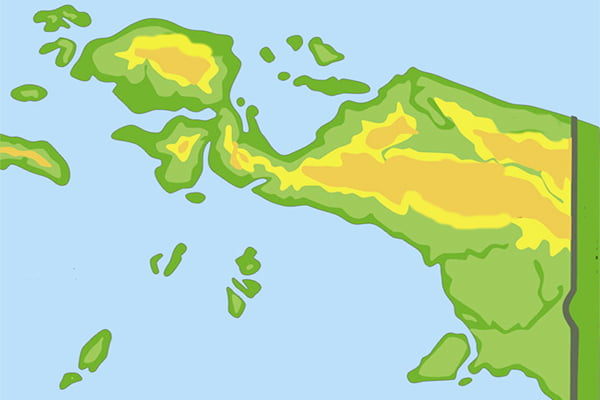Supporting the Development of Papua for the Welfare of the People
In overseeing Papua’s development in the era of President Jokowi’s leadership, Minister of Home Affairs (Mendagri) Muhammad Tito Karnavian gave strong encouragement to regional governments in the Land of Papua to accelerate the realization of the Regional Revenue and Expenditure Budget (APBD). In the 2023 Final Evaluation Coordination Meeting for Papua Development, the Minister of Home Affairs emphasized the importance of realizing APBD spending as the key to attracting private investment, both from within and outside the country. The Minister of Home Affairs highlighted that dependence on central transfers will not be enough to encourage Papua’s progress, so it is necessary to revive the private sector through innovation and easier licensing.
The Minister of Home Affairs also emphasized that private sector investment can strengthen regional fiscal conditions, preventing Papua from becoming dependent on central government transfer funds. He reminded that an unchanged mindset and reliance on central transfers could hinder private development, thereby complicating the economic conditions of society. In this context, the Minister of Home Affairs advised regional governments to focus on improving community welfare as a top priority, considering that lack of prosperity can trigger prolonged conflict.
Papua’s development under President Jokowi’s leadership can also be seen from the various development initiatives that have been implemented. One of the main focuses is infrastructure development, including the construction of road and bridge networks. Better infrastructure not only improves connectivity between regions, but also provides easier access to education, health and economic services.
PUPR Minister, Basuki Hadimuljono, explained that improving the welfare of the Papuan people is realized through opening up regional isolation and increasing access and connectivity, one of which is through the construction of the Trans Papua Road with a total length of 3,462 kilometers. Apart from that, the government also prioritizes development of the education and health sectors as an effort to improve people’s living standards. The construction of new schools and educational facilities provides educational opportunities for Papuan children, while the construction of health centers and hospitals increases Papuans’ access to medical care.
Papua also exploits economic potential through its natural resources. Local economic empowerment programs, including skills training, business capital assistance, and support for local business actors, have been implemented to create jobs, reduce unemployment rates, and overcome poverty. Infrastructure development in Papua also receives full support from the central government, ensuring community mobility and projects run well.
Economic growth in Papua continues to increase, showing the success of the accelerated development program aimed at improving the economic sector in Bumi Cendrawasih. Papuan community leader, Matthew Makuker, believes that the acceleration of infrastructure development in the Jokowi era has succeeded in encouraging regional economic growth. Adequate infrastructure not only improves the community’s economy, but also reduces travel time, speeds up logistics routes, and brings in investment.
At the Kick off meeting for the preparation of the Long Term Regional Development Plan (RPJPD) for Papua Province for 2025-2045, the Acting Assistant Regional Secretary for Papua Province for Government Affairs, Yohanes Walilo, opened the event by emphasizing the importance of designing fair and equitable regional development for the welfare of the community, especially indigenous people. Papua (OAP). The preparation of the RPJPD is considered a strategic step to accommodate the hopes and vision of regional development for the next 20 years.
This RPJPD document is also directed at ensuring the sustainability of the development of Papua Province, considering that the end of the 2005-2025 RPJMD period is approaching. In response to the 2005-2025 RPJPD evaluation, the Papua Provincial Government demonstrated a commitment to transparency and accountability in implementing long-term development planning. The socialization of the preparation of the initial draft of the RPJPD also aims to ensure equality of perception between the provincial government, the Papua DPR, and the MRP, as well as being the basis for preparing the RPJMD and facing the simultaneous regional elections in 2024. This activity also involves a number of Heads of Regional Work Units (SKPD) and resource persons from Bappenas and Ministry of Home Affairs.
Community support for Papua’s development in the era of President Jokowi’s leadership has also been an important pillar in the success of this initiative. The Papuan people have felt the positive impact of infrastructure development, increasing access to education, and empowering the local economy. Matthew Makuker, a Papuan community leader, stated that the acceleration of infrastructure development in the Jokowi era had succeeded in encouraging regional economic growth, providing a positive impetus to the community’s economy.
Massive development in Papua also creates jobs and opens up investment opportunities, which in turn provides real benefits for the local population. The community itself feels direct benefits from infrastructure improvements and increased access to education and health services. Better mobility, improved educational facilities, and improved health services have a positive impact that is felt by society on a daily basis.
Along with government efforts and positive community participation, the hope is that this support will continue to grow. Synergy between government, society and the private sector is the key to creating a supportive, sustainable and inclusive environment in Papua. Only with active involvement from all elements of society can the dream of a prosperous and sustainable Papua become a reality.
With all the efforts that have been made, the hope is that Papua will continue to move towards a better direction, creating a prosperous society as a reflection of successful development. Synergy between government, society and the private sector is considered key to continuing sustainable and inclusive development initiatives in Papua. Only in this way, equitable prosperity throughout the land of Papua can be realized.
